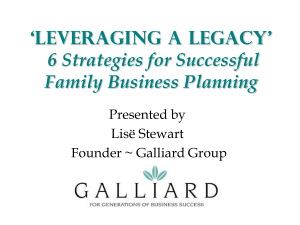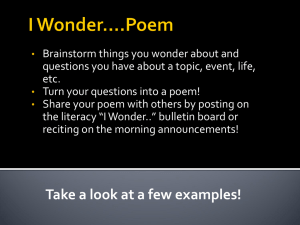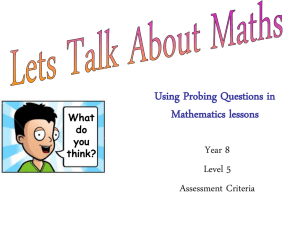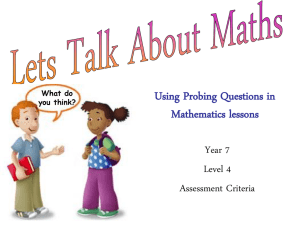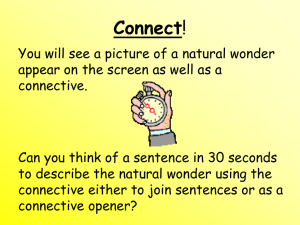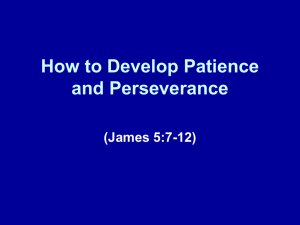How To Create a Confident Competitor
advertisement
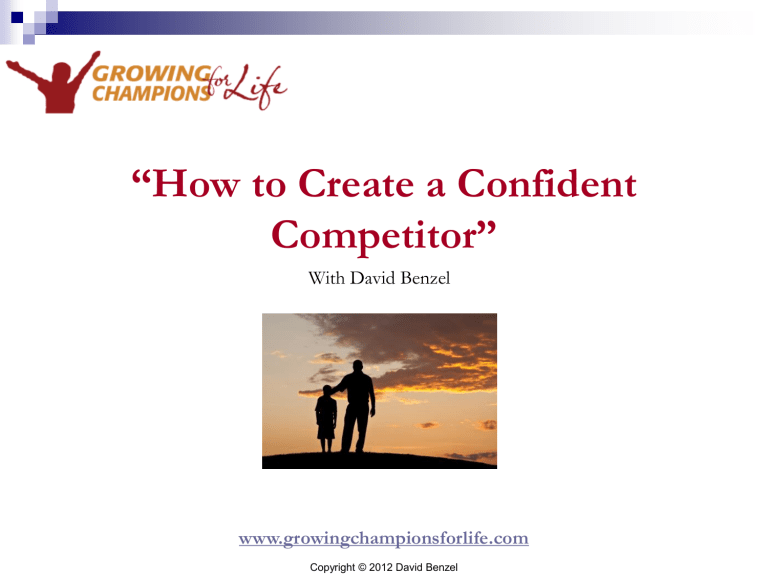
“How to Create a Confident Competitor” With David Benzel www.growingchampionsforlife.com Copyright © 2012 David Benzel Ask Yourself, “What do I really want?” I Want: I Want: My child to play well; My child to win; My child to improve quickly; My child to impress others; My child to move up; My child to receive recognition; My child to be a STAR! To enjoy watching my child play; To share my child’s experience; To be an example of good character; To be accepting of my child’s performances; To be loving of my child; To be a positive encourager; To be a trusted advisor & mentor; Held Hostage by My Ego Host to My Highest Purpose 2 Top Consequences of Increased Performance Pressure in School & Sports Teen suicide quadrupled since 1960’s; Increased teen depression; Increased anxiety disorders; Increased behavioral disorders; Increased substance abuse; What does Andre’ Agassi’s story say to you? www.growingchampionsforlife.com 3 What is the Purpose of Parenting? Why do we exist? To serve our highest purpose… Raise children who can: 1. Lead independent lives; 2. Maintain loving relationships; 3. Enjoy a sense of competence; TOOLS: Warmth (a Connection) & Appropriate Discipline “The Price of Privilege” by Madeline Levine 4 Make four observations about this picture. 1._________ 2._________ 3._________ 4._________ Why do we rush to judge? 5 The Four Faces of a Parent Concern for Performance High TIGER HERO A child fears being a disappointment A child free from fear SUPPLIER HELICOPTER A child fears being abandoned A child fears being hurt Low High Concern for Self-esteem www.growingchampionsforlife.com 6 What is FEAR? Where Does it Come From? • A thought based on a belief. The three fastest ways to undermine an child’s self belief: • An emotion of uncertainty. Criticize Complain Condemn Encourage Educate Edify 7 Fear: When Injected by Others The things parents & coaches say that can create fear: “If you don’t work harder you won’t make it to the next level.” The motive behind these statements: “To get you to do what I want you to do.” “If you don’t pay attention to my coaching you’ll get left behind.” “We’ve sacrificed a lot for you to have these lessons, so do your best.” “Be careful; I don’t want you getting hurt.” 8 Please quickly memorize this 32 digit number. 2_ 0_ 1_ 3_ 1_ 2_ 5_ 0_ 0_ 7_ 0_ 4_ 1_ 7_ 7_ 6_ 1_ 3_ 0_ 7_ 1_ 1_ 0_ 5_ 5_ 0_ 6_ 6_ 1_ 2_ 2_ 5 _ 2 0 1 3 ’1 2 5 0 0 7 0 4 1 7 7 6 1 3 mph $ 0 7 1 1 0 5 5 0 6 6 1 2 .2 5 No gas 9 The Performance Formula Performance equals: Talents + Strategies + Self-Belief Success OR A Lesson Learning “how to learn” unlocks the doors to building self-confidence. 10 Why Self Confidence Affects Performance Fact: No one ever performs consistently at a higher level _________ than what they believe to be _________ true about _______ themselves. Three important messages that build a child’s self belief: You are safe; You are capable; You are free to choose; What is our assignment? To improve what our children believe to be true about them. 11 The heart of influence beats stronger than the voice of control. Focused on Control Positional Force Fear/Intimidation Controlled w/ rules Short-term Negative impact Resentment “Required” performers Focused on Growth Personal Power Respect/Trust Influenced by values Long-term Positive impact Revered “Inspired” performers 12 To Reduce Fear We Need a Positive Learning Environment You cannot punish a child into excellence or perfection! Negative Reinforcement Positive Reinforcement Punishment Create a sanctuary Penalties Give specific praise Ridicule Redirect energies Embarrassment Live by values The _______ GOTCHA Parent “Don’t” Get rid of ________ The EXCELLENCE __________ Parent 13 An Important Discovery About Praise “Wow! You must be very smart.” “Wow! You must have worked really hard.” Preferred to choose easy tasks in order to look “smart”. Preferred to work hard in order to learn more. Group #1 Group #2 Dr. Carol Dweck’s Study – “Mindset” 14 Not All Praise is Created Equal! Praising effort and improvement creates a Growth Mindset & an eagerness to learn. Praising talents and gifts creates a Fixed Mindset & fear to face a challenge. You’re so talented. I’m impressed with your work You’re very fast. You’re a quick learner. Your turns are improving You’re so coordinated. You showed terrific patience today. You’re a smart player. Your attention to your stroke was noticeable. ethic. I like how you stuck with it. because of your steady work. 15 How Do We Get Everyone on the Same Page? Step 1 - Circle Your Top Ten Performance Character Strengths Effort Investment Hope Seeking Challenges Competitiveness Perseverance Love of Learning Self-Discipline Creativity Resiliency Punctuality Constructiveness Critical Thinking Self-Control Decisiveness Hard Work Humor Ambition Mental Toughness Optimism Focus Resourcefulness Bravery Determination Energy Investment Reliability Patience with Self Concentration Commitment Positivity Diligence Responsibility Moral Character Strengths Love for Others Truthfulness Justice Loyalty to Others Care for Others Integrity Fairness Patience with Others Kindness Humility Generosity Respect for Others Honesty Gratefulness Compassion Honor Step 2 – Rank order Your Selections From “The Only Way to Win” by Dr. Jim Loehr What do the people in each category have in common with others in that list? What’s the criteria for success in your home? A. B. 1. Were you always truthful? 2. Did you play fair? O.J. Simpson Roger Clemens Jose Canseco Marion Jones Floyd Landis Michael Vick Mark McGwire Chad Johnson Sam Bradford Monica Seles Arthur Ashe Payne Stewart Grant Hill Tim Tebow Tony Dungy John Wooden 3. Were you respectful of others? 4. Did you compete with honor? 5. Were you positive and constructive with team members? 6. Were you humble in victory? How can we teach our children to win at life? From “The Only Way to Win” by Dr. Jim Loehr If you could only choose six for your child to exemplify: … and at least half had to come from the Moral Character Strength list, which six would you choose? 18 PERFORMACE CHARACTER STRENGTHS Effective parents use “Wonder-Full” questions to guide parenting choices. STRENGTHS STRATEGIES To Show Perseverance To Take Responsibility To Learn New Skills To Enjoy SelfDiscipline To Invest Effort & Energy I wonder how I can help my child learn to overcome setbacks? I wonder how I can make it safe for my child to admit mistakes? I wonder how I can create opportunities for my child to love learning new skills? I wonder how I can teach the benefits of selfdiscipline ? I wonder how I can demonstrate genuine enthusiasm and also accept my child’s passions? 1. 1. 1. 1. 1. 2. 2. 2. 2. 2. 3. 3. 3. 3. 3. 19 Copyright © 2012 Growing Champions for Life MORAL CHARACTER STRENGTHS Effective parents use “Wonder-Full” questions to guide parenting choices. STRENGTHS STRATEGIES To Care for Others To Show Humility To Express Gratefulness To Be To Be Patient with Respectful of Others Others I wonder how I can teach my child a caring spirit? I wonder how I can help my child overcome pride? I wonder how I can create an attitude of gratitude? I wonder how I can teach the benefits of patience? I wonder how I can demonstrate genuine respect for all? 1. 1. 1. 1. 1. 2. 2. 2. 2. 2. 3. 3. 3. 3. 3. 20 Copyright © 2012 Growing Champions for Life Choosing Our Habits Seven Caring Habits Seven Deadly Habits Supporting Criticizing Encouraging Blaming Listening Complaining Accepting Nagging Trusting Threatening Respecting Punishing Negotiating differences Rewarding to control 1. The only person whose behavior we can control is our own. 2. All we can give another person is information. 3. All long-lasting psychological problems are relationship problems. “Choice Theory” by William Glasser 21 “Be guided by your values, not driven by your needs which are always fueled by your fears.” -- Larry Smith, Life Coach Today 22 Chump to Champ Principles 1. Your child looks to you for leadership and a world view. 2. Children want to know what/who is most important in the family and in life. 3. The most important gift we give is unconditional love and total acceptance regardless of performance levels. 4. Children are desperately looking for heroes at home and elsewhere. 23 24

